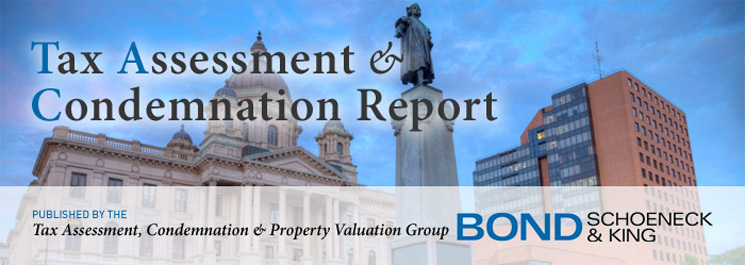
 We reported in February on an Appellate Division, Second Department case that held that public parking garages can qualify as tax exempt under Real Property Tax Law § 420-a. On July 1, the Court of Appeals overturned that decision.
We reported in February on an Appellate Division, Second Department case that held that public parking garages can qualify as tax exempt under Real Property Tax Law § 420-a. On July 1, the Court of Appeals overturned that decision.
The case, Matter of Greater Jamaica Dev. Corp. v. N.Y.C. Tax Commn., 2015 NY Slip Op 05620, involved a not-for-profit organization, Greater Jamaica, whose purpose was to promote the cultural and economic development of downtown Jamaica in New York City. The organization owned and operated five parking facilities which it used to offer parking to the public at below-market rates. Their goal in this endeavor was to help lure visitors, customers and businesses to the area by providing cheap parking. Any profit generated by the operation of the parking lots was used for the organization’s other charitable purposes.
The Appellate Division held that the parking facilities furthered the charitable purposes of the organization and qualified as tax exempt under Real Property Tax Law Section 420-a. The Court below relied in part on the fact that the organization was federally tax exempt under the Internal Revenue Code Section 501(c)(3). In a long line of cases dating to 1984 (e.g., D’Betlan v. Shandaken, 100 A.D.2d 641, 642), New York courts have used the IRS tax exemption as a guide for determining whether the organization qualified for purposes of this exemption. Any federally tax exempt organization was presumed to qualify under New York real property law if the owner had achieved IRC Section 501(c)(3) status.
In coming to its decision, the Court closely examined the tests for federal and state tax exemptions and found that they were too different. The IRS looks at whether a corporation is organized and operated for an exempt purpose as a whole. New York, on the other hand, looks at who owns the property and how it is used. New York’s test is less holistic and focuses on the specific property at issue. Additionally, Internal Revenue Code § 501(c)(3) provides a broad definition of “charitable,” while New York provides no definition at all. The Court reasoned that if New York legislatures had intended for “charitable” to be defined broadly, they would have referenced the 501(c)(3) definition or explicitly included it in the statute.
The Court also noted that there is a key difference between federal income tax and real property tax. Real property taxes are a significant source of revenue for local governments. The Court found that such a dissimilar test does not translate to determinations of real property tax exemptions. While there is no longer a presumption based on § 501(c)(3), the Court did note that it can still be considered as a factor.
The Court went on to examine the organization’s use of the parking facilities. While purposes such as spurring economic development and “the lessening of the burdens of Government” may qualify an organization for federal tax exemption, they fall short of § 420-a’s new, more exacting standard. The Court found that the benefit of cheap parking flows to local businesses, customers, and the general public. While that is a laudable goal, it is not charitable under § 420-a.
The Court was not persuaded by the line of cases (e.g., Matter of Merry-Go-Round Playhouse, Inc. v. Assessor of City of Auburn, 24 N.Y.3d 362) that allow exemptions for uses that are incidental to a charitable purpose. The Court found instead that cases like Matter of Vassar Bros. Hosp. v. City of Poughkeepsie (97 A.D.3d 756) were more on point. Vassar Bros. held that parking spaces owned by a non-profit that were set aside for private parties did not qualify as incidental to the primary purpose of the non-profit. The Court found the same reasoning applies here.
Finally, the fact that the parking facilities generated a profit neither helped nor hurt Greater Jamaica. Tax exempt status was not denied because there was a commercial element to the use of the parking facility. A property that is profitable is not automatically denied this exemption. Greater Jamaica argued that the facilities’ profitability bolstered their claim for tax exemption because all proceeds went to the organization’s other charitable purposes. The Court again focused on the use to rebuff Greater Jamaica. In that regard the use could best be described as merely a money-maker for Greater Jamaica, which, without a more charitable purpose, does not qualify it for this exemption.
(Thanks to Luke O’Brien, contributing author)
(Photo credit to www.nytix.com)